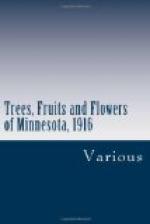Mr. Drum: You all remember some ten or more years ago when the apple trees were in blossom, and we had a terrible snow storm and blizzard and freeze. My orchard was protected both from the southwest and the northwest and the north, and following that freeze my trees had the only apples that were left in that country. I think that protection from the north and northwest is just as essential, especially in a position where the winds have a wide sweep. My house and my orchard slope off to the northwest, and I have a full sweep of the northwest wind there for miles. The house was set as it were on a pinnacle. I think the protection from the northwest is fully as essential in such a position as any other.
Mr. Whiting: This windbreak proposition is a question of locality. In the western part of the state, as well as in South Dakota—especially in South Dakota—we say that the south windbreak is decidedly the most important of any we can put in. We have more hot winds than you do here in the eastern part of Minnesota. You don’t have that trouble, but in western Minnesota you are very much like we are in South Dakota. Mr. Ludlow knows the conditions, and I say you must take that into consideration. If you are in that locality the south windbreak is decidedly the most important of any. Then I would say the windbreak on the south, west and north are all of considerable importance. Of course, you can overdo it, you can smother your orchard. You must guard against that, but we have too much air drainage.
In regard to the variety proposition, isn’t it true that you are growing too many perishable apples in Minnesota? I know it is so in South Dakota. We are growing too many of these early varieties; we ought to grow more winter varieties. If you want to build up a large commercial apple business you have got to raise more keepers. You are planting too many early varieties.
Mr. Dowds: I have been setting out apple trees more or less in different states for sixty years. If I was going to set out another orchard I would put windbreaks all around it, north, south, east and west, and the windbreak that I would use would be the yellow willow. It grows quick, it gives you a circulation of air, and it protects your trees. My experience in the last fifteen years has been that the yellow willow was the best windbreak that you can have around the house.
Mr. Brackett: Mr. Whiting says, grow winter apples. I want to know what winter apples will bring the money that Wealthy bring.
Mr. Whiting: That is a hard question, but isn’t it a fact that you grow too many Wealthys? Don’t you glut the market unless you have cold storage? You ought to work to that end just as much as possible; you ought to have more good keepers, better winter varieties.
The Society Library.
Books may be taken from the Library of the Minnesota
State Horticultural
Society by any member of the society on the following
terms:




